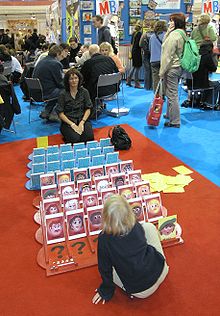Deduction game
As a deduction game (from latin deducere , reduced lead ') is generally a board game called, the player by means of logical conclusions have to reveal an initially unknown item in the course. These types of games include Sink Ships , Mastermind and many crime board games such as Cluedo and Scotland Yard .
features
A characteristic of deduction games is the presence of certain facts that are unknown to the players and that must be uncovered in the course of the game on the basis of logical conclusions . This can be, for example, the opponent's line-up (e.g. sinking ships ), a certain combination ( mastermind ) or the identity of the person you're looking for (e.g. Cluedo , Who am I? ).
The deductive inference approach is used in deduction games. This means that the players have to narrow down a general assumption (“everyone is suspicious”) that exists at the beginning based on logical conclusions and ultimately reduce it to a concrete assumption (“a certain person is suspicious”) that a solution to the question of the unknown facts.
The facts are revealed successively as the players gradually collect information and draw logical conclusions from it. Over time, for example, connections can be established or certain facts (game setups, colors, combinations) can be completely excluded. Information is usually collected by a player asking specific questions or expressing assumptions or assumptions to which another player answers in a certain way, and less often by performing certain actions. The amount of information collected increases in the course of the game, so that the initially unknown elements can be narrowed down further and finally clearly named.
Often, but not necessarily, the uncovering of the unknown facts is also the aim of a game of deduction (for example, naming the correct sequence of events in Cluedo ). In some games, however, the deductive approach is only a necessary or important means to achieve the actual goal. Some games also only allow players a limited number of moves or attempts at solutions. In addition, with many deduction games it is also possible to use luck to uncover the facts immediately or within a few moves and thus to bring the game to an end quickly without the use of logic.
A selection of classic deduction games and the unknown facts that need to be found out using a deductive approach:
- Black box , position of the balls hidden in the black box
- Cluedo , murderer, murder weapon and room
- Egghead , the combination of letters on your forehead
- Incognito , identity of the other players
- Mastermind , color combination
- Sink ships , positions of enemy ships
- Scotland Yard , whereabouts / movement of Mister X
- Stratego , positions of the opposing pieces, especially the flag
- Who am I? , the prominent person on your forehead
- Who was it? , Identity of the wanted thief
- Black Stories
- Code names and offshoots
Social deduction
In recent years in particular, deduction games have increasingly been combined with role-playing games , in which the other players are assigned roles that the other players have to guess. These social deduction games are usually also semi-cooperative , since usually several players in their factions play together and have to win against other factions or individuals. Well-known representatives of this game are:
- mafia
- The Mirkwood werewolves and various descendants
- Secret Hitler
- Two rooms and a boom
- Love letter
- Werwords
- Human punishment
- Agent undercover
See also
A more extensive list of deduction games can be found in the Deduction Games category .
Web links
- Bruno Faidutti, Frank Branham: Deduction Games , December 2000, The Games Journal (English)
